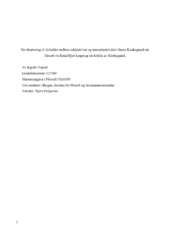En tilnærming til forholdet mellom subjektivitet og intersubjektivitet i Søren Kierkegaard sin filosofi via Knud Ejler Løgstrup sin kritikk av Kierkegaard
Master thesis
Permanent lenke
https://hdl.handle.net/1956/4128Utgivelsesdato
2010-05-20Metadata
Vis full innførselSamlinger
- Department of Philosophy [240]
Sammendrag
The area of my inquiry has been the philosophy of the danish philosopher Søren Kierkegaard (1813-1855), more specifically I have been working with problems related to the concepts of subjevtivity and intersubjectivity, the way in which those are related in the philosophy -kierkegaard. By the concept of subjectivity I think of the relation of the individual to oneself and the way in which one percepts oneself, and by intersubjectivity I mean the human relations which one has to other people and society. The philosophy of Kierkegaard has often been viewed as one in which there is an insurmountable gap between these to realms of human existence, and the danish theologist Knud Ejler Løgstrup (1905-1981) has been an exponent of such a crticism. Myself, I want to argue that the interpretation of Løgstrup is premature and not forcing. In my view the question of the relation to oneself is intimately entangkes with the question of the relation to other people in the thinking of Kierkegaard. I will use the contemorary danish theologist Pia Søltoft in defending my view. She tries to show that the questions of subjectivity and intersubjevtivity is entangled in the philosophy of Kierkegaard. However, she argues that in some of the works of Kierkegaard there is a problem related to intersubjectivity, related to socalled exceptions from the genral society.
Utgiver
The University of BergenOpphavsrett
Copyright the author. All rights reservedThe author
